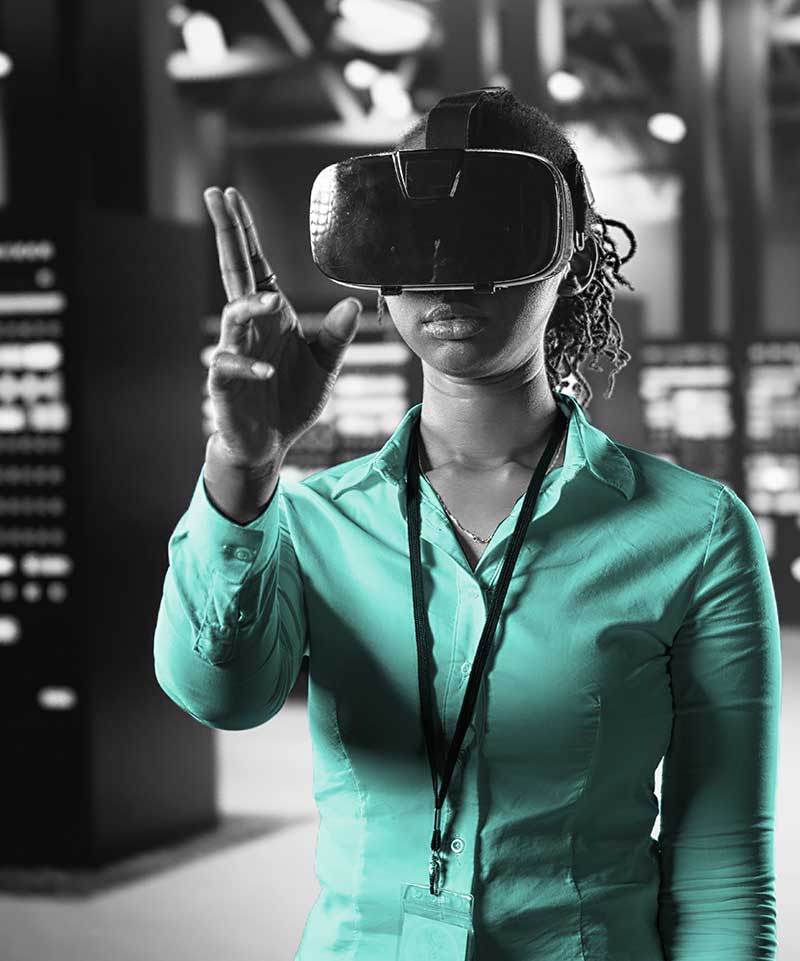

& PROJECTS
& PROJECTS
Our Partners
Northeastern University
ACCESS AI– Envisioning Access is collaborating with Northeastern University’s Khoury School of Computer Science on a groundbreaking initiative called ACCESS AI. Our joint endeavor focuses on developing a Chrome add-on specifically tailored for individuals who are visually impaired. The
primary objective is to facilitate the navigation of online job application platforms, addressing a significant gap in existing solutions. Current applications either inadequately address the needs of visually impaired users or fail to recognize and assist in completing mandatory fields within job applications.
Our proposed add-on aims to fill this void by providing comprehensive support throughout the job application process. Leveraging cutting-edge technologies and innovative design principles, the add-on will offer intuitive navigation features and assistive functionalities to ensure a seamless user experience. Specifically, it will assist users in identifying and completing all required fields accurately, thereby enhancing their efficiency and efficacy in applying for employment opportunities online.
Upon the completion of development, our next critical step involves testing the add-on in a real-world educational setting. We have secured collaboration with a vocational high school in Roxbury, Massachusetts, as our testing site. This strategic partnership will enable us to gather invaluable feedback from visually impaired students and educators, ensuring the add-on’s effectiveness and usability in diverse contexts.
In summary, our collaboration with Northeastern University’s Khoury School of Computer Science presents a unique opportunity to address a pressing need within the visually impaired community. By developing and testing this Chrome add-on, we aim to empower individuals with visual impairments to navigate online job applications independently and effectively, fostering greater inclusivity and accessibility in the digital sphere.
Cognimate
Envisioning Access is working with the company Cognimate to test their innovative smart glove. We have tested the glove on one individual, and we are looking for others to test this product that:
Recovers an individual’s fine motor skills due to the effects of
- Stroke
- Psychomotor development problems
- Cognitive impairment
- Dyspraxia
- Prolonged immobilization of the upper limb
- Impaired writing (poor handwriting)
- Post-traumatic neuropathies of the ulnar and radial nerves
- Multiple sclerosis
- Parkinson’s disease
- Muscular dystrophy
- Brain/spinal cord injuries
- Cerebral palsy
- Hand rehabilitation post injuries and operations
The goal of this Smart glove to is to boost motor skills recovery and improve fine motor skills, cognitive function and emotional state. The rehabilitation is based on the principles of neuroplasticity of the brain, gamification, biofeedback, and patented methodology. To use the glove the client plays exercising and entertaining computer games where controls are based on wrist and palm movements. Movements are detected by a special haptic glove, which automatically adjusts game difficulty to each client’s individual abilities and precisely monitors the rehabilitation process.
The process is easy and can be used remotely at home.
Tech Start-Up
Envisioning Access is supporting the development of VISORS (Visually Impaired Scene and Object Recognition System) by the Washington (state) based company Waipoint, Inc. At Envisioning Access, we believe that VISORS empowers those who are blind/low vision to be
independent. VISORS presents a potentially groundbreaking solution for individuals with visual impairments by providing an enhanced, informed perspective of their surroundings. By leveraging AI technologies, it enables users to accurately locate objects, receive guidance on reaching them, and access detailed information through audio communications. While it does not seek to replace human vision, VISORS serves as an invaluable “second pair of eyes” empowering visually impaired individuals with greater independence and autonomy.
VISORS detects a particular object and directs the user towards it by real-time tracking. It points to and directs to a particular object requested by the user based on AI learning, and then communicates details about the surrounding and nearby objects (i.e., product’s nutrition information, obstacles avoidance, finding a lost item, alerts and safety precautions) Thus, VISORS provides independence, and users no longer must rely on room memory or external help to complete simple tasks.
There is a three-phase plan to develop and test this new technology. With support from Envisioning Access, Phase I is complete. Now, the developers can move into Phase II, which involves a volunteer with visual impairments who is testing the initial prototype to offer feedback for improvements. In Phase II the developer is testing real-user experiences and operations. In Phase III a higher degree of communication and improved accuracy of object recognition and guidance will be introduced.
Projects in Development
The Billy Project
For many with physical disabilities using virtual reality to play games, use social sites or even apply for employment opportunities is not accessible. In the gaming world, the games themselves are fun but the actual tools needed to play them may not be accessible to those with mobility impairments. Many of the games require using various parts of the body including hands, or twisting the torso in a way not possible
if paralyzed. Some games may require standing that may also be difficult for those in wheelchairs or with limb impairments. The same holds true if an individual with a mobility disability wants to access the virtual reality headset or hand controls to access social sites or employment sites to interview for a job or even enter a work space. To make the opportunity to use virtual reality more accessible for those with mobility disabilities, including those with spinal cord injuries, multiple sclerosis and others who cannot use or do not have the full use of their arms or hands, or may have difficulty standing for long periods of time or full body movement as many games require, we are looking at what makes the hardware accessible.
Envisioning Access is working with a current client who is living with a spinal cord injury who is spearheading this project. We are currently discussing the project with both a university and a tech start-up to determine where the work is best suited.
Coming Soon
A Mixed Reality Storytelling Project
We are currently working on an exciting project with an arts group that will look at how augmented and virtual reality can be used to relay compelling stories that have not been seen or heard.
Join Us!
Don’t Be Left Out
Do you have a story to tell or a project that involves robotics, AI or mixed reality that you would like Envisioning Access to consider? Please reach out, we want to speak with you.


